19 start with E start with E
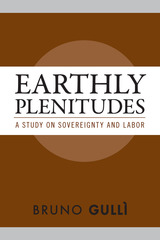
Gullì first reviews approaches to sovereignty by philosophers as varied as Gottfried Leibniz and Georges Bataille, and then looks at concrete examples where the alliance of sovereignty and capital cracks under the potency of living labor. He examines contingent academic labor as an example of the super-exploitation of labor, which has become a global phenomenon, and as such, a clear threat to the sovereign logic of capital. Gullì also looks at disability to assert that a new measure of humanity can only be found outside the schemes of sovereignty, productivity, efficiency, and independence, through care and caring for others, in solidarity and interdependence.
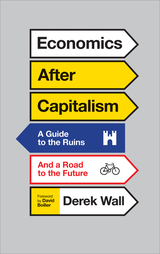
Challenging the arguments for markets, mainstream economics, and capitalism from Adam Smith onwards, Economics After Capitalism provides a step-by-step guide to the writers, movements, and schools of thought critical of neoliberal globalization. These thinkers range from Keynesian-inspired reformists such as George Soros and Joseph Stiglitz and critics of inequality like Thomas Piketty and Amartya Sen to more radical voices such as Naomi Klein, Marxists such as David Harvey, anarchists, and autonomists including Antonio Negri and Michael Hardt.
Wall explains Marx’s economic system in a twenty-first century context and outlines how we can build a democratic economy that, by drawing on the ideas of Elinor Ostrom, Hugo Chavez and others, can renew socialism. In providing a clear and accessible guide to the economics of anti-capitalism, Wall successfully demonstrates that an alternative to rampant climate change, elite rule and financial chaos is not just necessary, but possible.

Now in its second edition, Economics for Everyone is an antidote to the abstract and ideological way that economics is normally taught and reported. Key concepts such as finance, competition, and wages are explored, and their importance to everyday life is revealed. Stanford answers such questions as “Do workers need capitalists,” “Why does capitalism harm the environment,” and “What really happens on the stock market.”
Illustrated with humorous and educational cartoons by Tony Biddle, and supported with a comprehensive set of web-based course materials for popular economics courses, this book will appeal to students of social sciences who need to engage with economics as well as anyone seeking to better understand today’s economy.
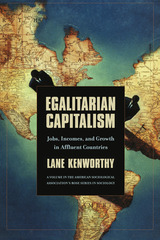

The second half of the nineteenth century witnessed some of the greatest gold mining migrations in history when dreams of bonanza lured thousands of prospectors and diggers to the far corners of the earth—including the Gold Coast of West Africa.
El Dorado in West Africa explores the first modern gold rush of Ghana in all of its dimensions—land, labor, capital, traditional African mining, technology, transport, management, the clash of cultures, and colonial rule. The rich tapestry of events is crisscrossed by unexpected ironies and paradoxes.
Professor Dumett tells the story of the expatriate-led gold boom of 1875-1900 against the background of colonial capitalism. Through the use of oral data, he also brings to light the expansion of a parallel “African gold mining frontier,” which outpaced the expatriate mining sector.
African women, kings and chiefs, and the ordinary Akan farmer/miners, as well as European engineers and speculators, are the focal points of this study. It probes in depth the productive and developmental features and the turbulent and shattering effects of mining capitalism on African societies.

In this magisterial study, Michael Smith explains how France left behind small-scale merchant capitalism for the large corporate enterprises that would eventually dominate its domestic economy and project French influence throughout the world.
Arguing against the long-standing view that French economic and business development was crippled by missed opportunities and entrepreneurial failures, Smith presents a story of considerable achievement. French companies made major contributions to the Second Industrial Revolution of 1880-1930, especially in ferrous and non-ferrous metallurgy, electrochemicals, industrial gases, and motor vehicles. Rejecting the notion that France took a separate route to economic modernity, Smith argues that it tracked other industrial nations along a path dominated by large-scale production and corporate enterprise. Technological and organizational capabilities acquired by French companies prior to 1930 played a key role in the country's rapid economic recovery after World War II and its broader economic success in the second half of the twentieth century. Smith also addresses the distinctive characteristics of French economic and business development, including the pivotal role of the French state, the pervasive influence of French financiers, and the significance of labor conflict.
This superb account is an invaluable contribution to business history and the history of modern France.

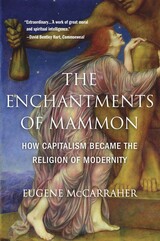
“An extraordinary work of intellectual history as well as a scholarly tour de force, a bracing polemic, and a work of Christian prophecy…McCarraher challenges more than 200 years of post-Enlightenment assumptions about the way we live and work.”
—The Observer
At least since Max Weber, capitalism has been understood as part of the “disenchantment” of the world, stripping material objects and social relations of their mystery and magic. In this magisterial work, Eugene McCarraher challenges this conventional view. Capitalism, he argues, is full of sacrament, whether one is prepared to acknowledge it or not. First flowering in the fields and factories of England and brought to America by Puritans and evangelicals, whose doctrine made ample room for industry and profit, capitalism has become so thoroughly enmeshed in the fabric of our society that our faith in “the market” has become sacrosanct.
Informed by cultural history and theology as well as management theory, The Enchantments of Mammon looks to nineteenth-century Romantics, whose vision of labor combined reason, creativity, and mutual aid, for salvation. In this impassioned challenge to some of our most firmly held assumptions, McCarraher argues that capitalism has hijacked our intrinsic longing for divinity—and urges us to break its hold on our souls.
“A majestic achievement…It is a work of great moral and spiritual intelligence, and one that invites contemplation about things we can’t afford not to care about deeply.”
—Commonweal
“More brilliant, more capacious, and more entertaining, page by page, than his most ardent fans dared hope. The magnitude of his accomplishment—an account of American capitalism as a religion…will stun even skeptical readers.”
—Christian Century
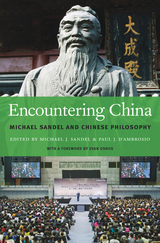
In the West, Harvard philosopher Michael Sandel is a thinker of unusual prominence. In China, he’s a phenomenon, greeted by vast crowds. China Daily reports that he has acquired a popularity “usually reserved for Hollywood movie stars.” China Newsweek declared him the “most influential foreign figure” of the year. In Sandel the Chinese have found a guide through the ethical dilemmas created by the nation’s swift embrace of a market economy—a guide whose communitarian ideas resonate with aspects of China’s own rich and ancient philosophical traditions.
Chinese citizens often describe a sense that, in sprinting ahead, they have bounded past whatever barriers once held back the forces of corruption and moral disregard. The market economy has lifted millions from poverty but done little to define ultimate goals for individuals or the nation. Is the market all there is? In this context, Sandel’s charismatic, interactive lecturing style, which roots moral philosophy in real-world scenarios, has found an audience struggling with questions of their responsibility to one another.
Encountering China brings together leading experts in Confucian and Daoist thought to explore the connections and tensions revealed in this unlikely episode of Chinese engagement with the West. The result is a profound examination of diverse ideas about the self, justice, community, gender, and public good. With a foreword by Evan Osnos that considers Sandel’s fame and the state of moral dialogue in China, the book will itself be a major contribution to the debates that Sandel sparks in East and West alike.
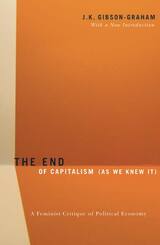
“Paralyzing problems are banished by this dazzlingly lucid, creative, and practical rethinking of class and economic transformation.” —Meaghan Morris, Lingnan University, Hong Kong
“Profoundly imaginative.” —Eve Kosofsky Sedgwick, City University of New York “Filled with insights, it is clearly written and well supported with good examples of actual, deconstructive practices.” —International Journal of Urban and Regional Research
J. K. Gibson-Graham is the pen name of Katherine Gibson and Julie Graham, feminist economic geographers who work, respectively, at the Australian National University in Canberra and the University of Massachusetts Amherst.

The End of Organized Capitalism argues that—despite Marx’s and Weber’s insistence that capitalist societies become increasingly more ordered—we now live in an era of “disorganized capitalism.” The book is devoted to a systematic examination of the shift to disorganized capitalism in five Western nations (Britain, the United States, France, West Germany, and Sweden). Through the analysis of space, class, and culture, Lash and Urry portray the restructuring of capitalist social relations that has resulted from this disorganization. They adduce evidence for the claims that in each of the nations there is a movement toward a deconcentration of capital within nation-states; toward the increased separation of banks, industry and the state; and toward the redistribution of productive relations and class-relevant residential patterns.
The authors also show that national disparities in contemporary, disorganized capitalism can be understood through close examination of the extent to which, and mode in which, capitalism became historically organized in each of the five countries under consideration.
The lucid arguments and judicious comparisons in this book will be of great interest to political scientists, sociologists, geographers, economists, and historians.

Gregory Elliott argues that Marx is central to all three accounts and that, along with the Manifesto, they form a quartet of analyses of the results and prospects of capitalism and socialism, which are of enduring significance for the Left.
Senses of an Ending provides a readable survey of key historical and political thinkers that will appeal to anyone interested in modern political thought.
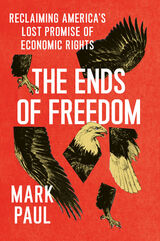
Since the Founding, Americans have debated the true meaning of freedom. For some, freedom meant the provision of life’s necessities, those basic conditions for the “pursuit of happiness.” For others, freedom meant the civil and political rights enumerated in the Bill of Rights and unfettered access to the marketplace—nothing more. As Mark Paul explains, the latter interpretation—thanks in large part to a particularly influential cadre of economists—has all but won out among policymakers, with dire repercussions for American society: rampant inequality, endemic poverty, and an economy built to benefit the few at the expense of the many.
In this book, Paul shows how economic rights—rights to necessities like housing, employment, and health care—have been a part of the American conversation since the Revolutionary War and were a cornerstone of both the New Deal and the Civil Rights Movement. Their recuperation, he argues, would at long last make good on the promise of America’s founding documents. By drawing on FDR’s proposed Economic Bill of Rights, Paul outlines a comprehensive policy program to achieve a more capacious and enduring version of American freedom. Among the rights he enumerates are the right to a good job, the right to an education, the right to banking and financial services, and the right to a healthy environment.
Replete with discussions of some of today’s most influential policy ideas—from Medicare for All to a federal job guarantee to the Green New Deal—The Ends of Freedom is a timely and urgent call to reclaim the idea of freedom from its captors on the political right—to ground America’s next era in the country’s progressive history and carve a path toward a more economically dynamic and equitable nation.
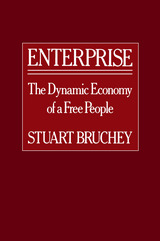
Not since Charles and Mary Beard's The Rise of American Civilization has a narrative been written for the general reader and student alike that so superbly explicates the origins of American capitalism. Arguing that the central fact explaining the success of the American experiment is the development of the economy, the distinguished economic historian Stuart Bruchey shows the reciprocal relationship between economic growth and values, law, and social and political change, as well as between economic development and the more traditional variables of capital, labor, and resources.
Enterprising, risk-taking men and women in all walks of life are at the center of the remarkable story that is the American dream and reality. The farm family moving to an unfamiliar environment and trying new technology; the business executive or worker with a new idea for improving a machine; the jurist venturing down a different legal path to sharpen incentives to invest; lawmakers of all kinds risking tenure or office by giving priority to measures designed to entice capital and labor to their jurisdictions—these entrepreneurs provided the leaven that gradually raised the living standards of the average person to heights unknown anywhere in the past.
Twenty years in the writing, Enterprise summarizes the scholarly contributions of historians and social scientists. It reaches deep into the European past—to fourteenth-century Italy—to retrace the origins of American capitalism. The author tells the story of individual achievement and vertical social mobility and their triumph over obstacles, a never-ending theme of American enterprise. Whether Americans maintain those heights today or will suffer a decline as the price of 1980s “now-nowism”—as Richard Darman characterizes this decade of wanting everything, at once, and paying nothing—remains to be seen.
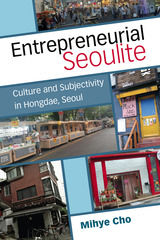
Recent research on Korean culture approaches the K-wave phenomenon from the perspectives of cultural consumption, media analysis, and cultural management and policy. Meanwhile, studies on Seoul have centered on its transformation as a global, creative city. Rather than examining the K-wave or the city itself, this book explores the experience of living through the city-in-transition, focusing on the relationship between “the ideology that justified engagement in capitalism” and the “subjectification process.” The book aims to understand the project to institutionalize a cultural district in Hongdae as a demonstration of the coevolution of ideologies and citizenship in a society undergoing rapid liberalization—politically, culturally, and economically.
A cultural turn took place in Korea during the 1990s, amid the economic prosperity driven by state-led industrialization and the collapse of the military dictatorship due to democratization movements. Cultural critiques, emerging as an alternative to social movements, proliferated to assert the freedom and autonomy of individuals against regulatory systems and institutions. The nation was hit by the Asian financial crisis in 1997, and witnessed massive economic restructuring including layoffs, stakeouts, and a prevalence of contingent employment. As a result, the entire nation had to find new engines of economic growth while experiencing a creative destruction. At the center of this national transformation, Seoul has sought to recreate itself from a mega city to a global city, equipped with cutting-edge knowledge industries and infrastructures.
By juxtaposing the cultural turn and cultural/creative city-making, Entrepreneurial Seoulite interrogates the formation of new citizen subjectivity, namely the enterprising self, in post-Fordist Seoul. What kinds of logic guide individuals in the engagement of new urban realities in rapidly liberalized Seoul—culturally and economically? In order to explore this query, Mihye Cho draws on Weber’s concept of “the spirit of capitalism” on the formation of a new economic agency focusing on the re-configuration of meanings, and seeks to capture a transformative moment detailing when and how capitalism requests a different spirit and lifestyle of its participants. Likewise, this book approaches the enterprising self as the new spirit of post-Fordist Seoul and explores the ways in which people in Seoul internalize and negotiate this new enterprising self.

Taking cues from the Japanese concept of ethical or stakeholder capitalism, this book demonstrates how the business activities of firms in Thailand and Indonesia are guided by their perceptions of morality in society and their concerns about the environment. The authors explore the likelihood that foreign influences contributed to the development of such management philosophies, for example through the expansion of Japanese subsidiary firms in the 1980s or the spread of foreign articulations of the concept of corporate social responsibility (CSR) since the 2000s. Companies in both countries may exercise a degree of pragmatism in how they develop these activities. As the authors reveal, the perceptions of morality in business that have shaped many entrepreneurs and companies in Thailand and Indonesia are their responses to the dynamic political, social, and economic factors that have formed the business environments of both countries.
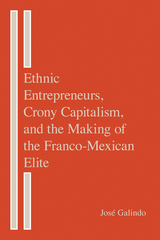
Ethnic Entrepreneurs, Crony Capitalism, and the Making of the Franco-Mexican Elite provides a new way to understand the scope and impact of crony capitalism on institutional development in Mexico. Beginning with the Porfiriato, the period between 1876 and 1911 named for the rule of President Porfirio Díaz, José Galindo identifies how certain behavioral patterns of the Mexican political and economic elite have repeated over the years, and analyzes aspects of the political economy that have persisted, shaping and at times curtailing Mexico’s economic development.
Strong links between entrepreneurs and politicians have allowed elite businessmen to receive privileged support, such as cheap credit, tax breaks, and tariff protection, from different governments and to run their companies as monopolies. In turn, successive governments have obtained support from businesses to implement public policies, and, on occasion, public officials have received monetary restitution. Galindo notes that Mexico’s early twentieth-century institutional framework was weak and unequal to the task of reining in these systematic abuses. The cost to society was high and resulted in a lack of fair market competition, unequal income distribution, and stunted social mobility.
The most important investors in the banking, commerce, and manufacturing sectors at the beginning of the twentieth century in Mexico were of French origin, and Galindo explains the formation of the Franco-Mexican elite. This Franco-Mexican narrative unfolds largely through the story of one of the richest families in Mexico, the Jeans, and their cotton textile empire. This family has maintained power and wealth through the current day as Emilio Azcárraga Jean, a great-grandson of one of the members of the first generation of the Jean family to arrive in Mexico, owns Televisa, a major mass media company with one of the largest audiences for Spanish-language content in the world.
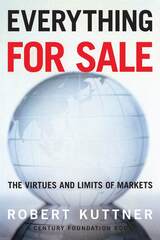
"The best survey of the limits of free markets that we have. . . . A much needed plea for pragmatism: Take from free markets what is good and do not hesitate to recognize what is bad."—Jeff Madrick, Los Angeles Times
"It ought to be compulsory reading for all politicians—fortunately for them and us, it is an elegant read."—The Economist
"Demonstrating an impressive mastery of a vast range of material, Mr. Kuttner lays out the case for the market's insufficiency in field after field: employment, medicine, banking, securities, telecommunications, electric power."—Nicholas Lemann, New York Times Book Review
"A powerful empirical broadside. One by one, he lays on cases where governments have outdone markets, or at least performed well."—Michael Hirsh, Newsweek
"To understand the economic policy debates that will take place in the next few years, you can't do better than to read this book."—Suzanne Garment, Washington Post Book World

Soaring income inequality and unemployment, expanding populations of the displaced and imprisoned, accelerating destruction of land and water bodies: today’s socioeconomic and environmental dislocations cannot be fully understood in the usual terms of poverty and injustice, according to Saskia Sassen. They are more accurately understood as a type of expulsion—from professional livelihood, from living space, even from the very biosphere that makes life possible.
This hard-headed critique updates our understanding of economics for the twenty-first century, exposing a system with devastating consequences even for those who think they are not vulnerable. From finance to mining, the complex types of knowledge and technology we have come to admire are used too often in ways that produce elementary brutalities. These have evolved into predatory formations—assemblages of knowledge, interests, and outcomes that go beyond a firm’s or an individual’s or a government’s project.
Sassen draws surprising connections to illuminate the systemic logic of these expulsions. The sophisticated knowledge that created today’s financial “instruments” is paralleled by the engineering expertise that enables exploitation of the environment, and by the legal expertise that allows the world’s have-nations to acquire vast stretches of territory from the have-nots. Expulsions lays bare the extent to which the sheer complexity of the global economy makes it hard to trace lines of responsibility for the displacements, evictions, and eradications it produces—and equally hard for those who benefit from the system to feel responsible for its depredations.
READERS
Browse our collection.
PUBLISHERS
See BiblioVault's publisher services.
STUDENT SERVICES
Files for college accessibility offices.
UChicago Accessibility Resources
home | accessibility | search | about | contact us
BiblioVault ® 2001 - 2024
The University of Chicago Press









